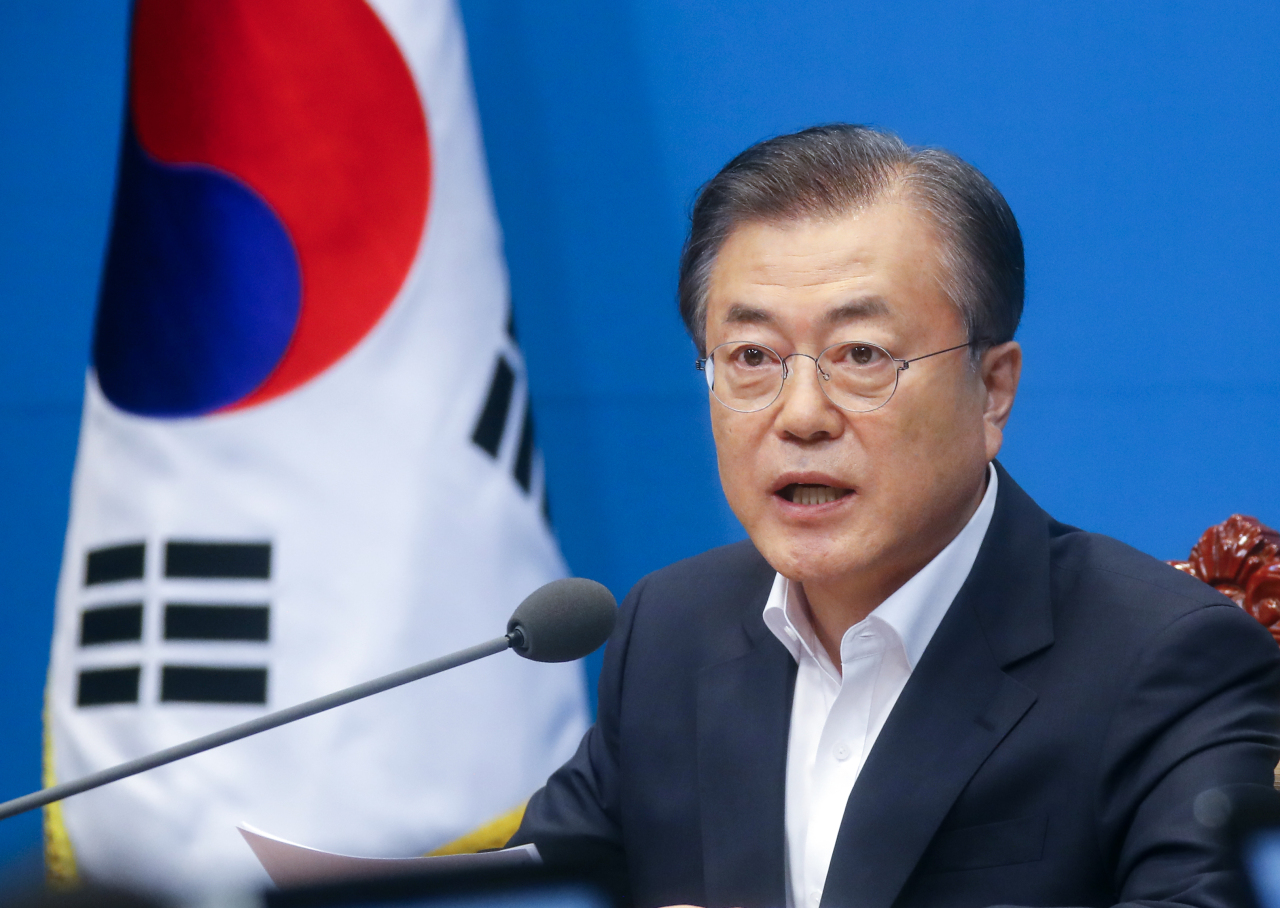Korea is gearing up to fire back at Japan after the neighboring country removed its fast-track export status, while seeking ways to mitigate the economic impact of the trading restrictions as the two Asian countries’ bilateral relations sink to a recent rock bottom.
The government plans to announce measures to strengthen the competitiveness of the materials and parts industries this week that will come under tighter rules for export approval, following the Tokyo’s cabinet’s decision Friday to remove Seoul from its whitelist of trusted trading partners. The measure is to take effect on Aug. 28.
The government plans to announce measures to strengthen the competitiveness of the materials and parts industries this week that will come under tighter rules for export approval, following the Tokyo’s cabinet’s decision Friday to remove Seoul from its whitelist of trusted trading partners. The measure is to take effect on Aug. 28.

The restrictive measure, which will have a direct impact on 159 items that Korea imports from Japan, is seen as a second retaliatory step in a growing dispute over Japan’s wartime force labor.
Tensions flared on July 4 when Japan implemented restrictions on core materials needed to make semiconductors and displays -- targeting Seoul’s flagship industrial sector heavily reliant on the import of materials from Tokyo.
Despite Seoul’s repeated calls to resolve historical issues diplomatically and the US’ suggestion to consider a “standstill agreement,” Japan proceeded with the downgrading of the trade relationship.
On Sunday, Prime Minister Lee Nak-yon denounced Japan’s export restrictions, calling them a “reckless and risky decision” during a three-way consultation session of Cheong Wa Dae, the government and ruling Democratic Party of Korea.
“Concerns have been raised about security in Northeast Asia and the global economy due to Japan’s successive measures (against Korea),” he said.
Lee said the government would put forward efforts to turn a crisis into an opportunity by diligently implementing industrial measures aimed at reducing dependency on Japanese imports and expanding the base of its industries.
President Moon Jae-in expressed deep regret, warning Korea would take corresponding measures and Japan would have to bear full responsibility for its decisions.
“As it has become clear that the responsibility for the worsening situation lies with Japan, I clearly warn that the Japanese government will be fully responsible for what happens going forward,” Moon said in a nationally televised emergency Cabinet meeting. “We won’t be defeated by Japan again.”
Cheong Wa Dae has formed a task force to swiftly manage the situation, and the five main political parties have launched a consultative body of officials from the government and private and public sectors.
Hong Nam-ki, South Korean deputy prime minister and economy and finance minister, said Friday that Korea will step up safety measures against Japan, starting with areas such as tourism, food and waste.
His remarks prompted speculation about a possible tit-for-tat response, particularly raising the bar on the import of Japanese products from Fukushima prefecture, which could possibly contain radioactive substances following a major nuclear accident in 2011.
Diplomatic efforts to rally support from the international community were made during a regional forum that took place in Thailand last week.
Foreign Minister Kang Kyung-wha told Japanese counterpart Taro Kono that the fundamental principle of the “free flow of trade and commerce has been challenged in the region” by measures taken by Tokyo.
On the sideline of the annual gathering involving the 10-member Association of Southeast Asian Nations, Kang and Kono held a bilateral meeting but failed to narrow the gap on the trade row.
Japan has said the measures are based on national security concerns, and also to address Seoul’s inadequate export controls. Korea believes they are in retaliation for Korean court rulings last year that ordered Japanese firms to compensate wartime forced laborers.
As Japan cited national security reasons for the moves, Seoul is considering terminating the General Security of Military Information Agreement, a pact to exchange confidential and tier-1 military information between the two countries.
“The government will take comprehensive measures in the future, including whether it is right to continue to share sensitive military information with countries that raise security issues and lack of trust in us,” said Kim Hyun-chong, deputy chief of Cheong Wa Dae’s National Security Office.
Earlier, Japan’s Chief Cabinet Secretary Yoshihide Suga said the intelligence-sharing pact should be maintained as it strengthens bilateral security cooperation and contributes to regional peace and stability. The pact has been automatically renewed annually, but it could be scrapped if either country gives notice by this year’s deadline of Aug. 24.
Along with the agreement renewal deadline, historical and diplomatic events that could escalate or ease tensions between the two countries are looming.
They include an Aug. 15 speech to be delivered by President Moon Jae-in to mark Liberation Day, the United Nations General Assembly in September as well as the official coronation of Emperor Naruhito on Oct. 22.
By Park Han-na (hnpark@heraldcorp.com)


















![[KH Explains] Hyundai's full hybrid edge to pay off amid slow transition to pure EVs](http://res.heraldm.com/phpwas/restmb_idxmake.php?idx=652&simg=/content/image/2024/04/18/20240418050645_0.jpg&u=20240418181020)

![[Today’s K-pop] Zico drops snippet of collaboration with Jennie](http://res.heraldm.com/phpwas/restmb_idxmake.php?idx=642&simg=/content/image/2024/04/18/20240418050702_0.jpg&u=)